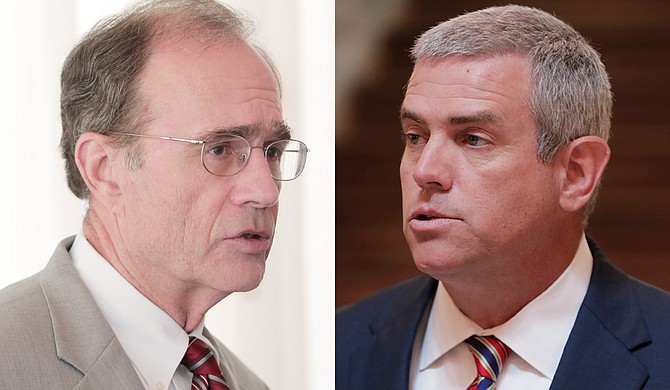The lawsuit was filed May 30 against two Republican officials—Secretary of State Delbert Hosemann (left), who is Mississippi's top elections officer, and House Speaker Philip Gunn (right). Photo by Imani Khayyam
JACKSON, Miss. (AP) — A federal judge will hear arguments Friday in a lawsuit that challenges Mississippi's unique, multistep process of electing the governor and other statewide officials—an electoral process that critics say is designed to thwart black political power.
The hearing happens less than a month before the Nov. 5 gubernatorial election between Republican Lt. Gov. Tate Reeves and Democratic Attorney General Jim Hood.
Mississippi's 1890 constitution requires a statewide candidate to win a majority of the popular vote and a majority of the 122 state House districts. If nobody wins both, the election is decided by the House, now controlled by Republicans.
The multistep process was written at a time when white politicians across the South were enacting Jim Crow laws to erase black political power that had been gained during Reconstruction. No other state in the U.S. uses such a method to choose governor.
Reeves and Hood are both white, but Mississippi has a history of racially polarized voting with Democrats doing well among black voters and Republicans among white ones.
Attorneys for black plaintiffs say that, because of the way Mississippi House districts are drawn, the electoral system dilutes African American votes.
"Because white and African American Mississippians overwhelmingly vote for different candidates, and because of the geographic and electoral concentration of the racial groups among the House districts, African Americans' candidates of choice must obtain a significantly larger share of the statewide population in order to win a majority of House districts, as compared to candidates preferred by white voters," an attorney for the plaintiffs, Uzoma N. Nkwonta, wrote in court papers.
U.S. District Judge Daniel P. Jordan III will hear arguments about the plaintiffs' request that he issue a preliminary injunction to block the state from using the system. It's unclear, though, how fast Jordan will act on that request.
The lawsuit was filed May 30 against two Republican officials—Secretary of State Delbert Hosemann, who is Mississippi's top elections officer, and House Speaker Philip Gunn.
Attorney Trey Jones, representing Hosemann and Gunn, wrote in court documents that Mississippi's system is not discriminatory.
"This suit was obviously filed because of some concern about how the rules 'might' impact Democratic candidates," Jones wrote. "That is not a valid basis for which to seek relief from this Court."
Eric Holder, who was the first African American to serve as U.S. attorney general, is now chairman of the National Democratic Redistricting Committee, whose affiliated foundation is providing financial and legal backing for the lawsuit. Plaintiffs include Leslie Burl McLemore, a retired professor of political science at Jackson State University.
The 1999 Mississippi governor's race was decided by the House after nobody received the required majorities in a four-person race. The top two candidates were white, and House members chose the Democrat who had received the most votes. At the time, the House was controlled by Democrats.
Mississippi's current Republican governor, Phil Bryant, is limited by law to two terms and could not run again this year.
Copyright Associated Press. All rights reserved. This material may not be published, broadcast, rewritten, or redistributed.



Comments
Use the comment form below to begin a discussion about this content.
comments powered by Disqus